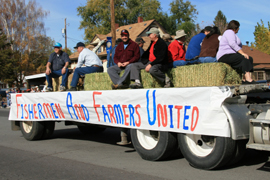http://www.capitalpress.info/main.asp?Search=1&ArticleID=31062&SectionID=67&SubSectionID=&S=1
ODA honors farmer/fisherman
effort
Groups recognized as
Cooperators of Year
Mateusz Perkowski Capital Press March 16, 2006

Farmers and fishermen showed their unity at
the Klamath Potato Festival in Merrill, Oregon
last fall. The Oregon Department of
Agriculture will recognize the two groups as
Cooperators of the Year at the 2007 Ag
Progress Awards Dinner in Salem on March 22.
|
Nothing inspires kinship like an ice chest
filled with beer.
In March 2006, Newport, Ore., fisherman Bob
Kemp said in an Associated Press article that
he planned to throw some suds and crabs into a
cooler and head down to the Klamath basin to
meet with farmers and figure out what to do
about diminished salmon returns in the Klamath
River.
Kemp's show of goodwill snowballed into a
collaborative relationship between farmers and
fishermen whose livelihoods are tied to the
fate of the Klamath waters. In honor of their
efforts, the Oregon Department of Agriculture
will recognize the two groups as Cooperators
of the Year at the 2007 Ag Progress Awards
Dinner in Salem on March 22. |
"We're looking for solutions that keep everyone
in business," said Scott Boley, a fisherman from
Gold Beach, Ore., who will accept the award on
behalf of the Oregon Salmon Commission.
After visiting back and forth informally,
fishermen and farmers are now in the process of
formally organizing as the Common Ground Alliance,
a group that will represent natural resource
interests and push for projects that benefit fish
without harming agriculture.
"We found out we really have a lot in common,"
said Dick Carleton, a potato grower from Merrill,
Ore., who will accept the award on behalf of
Klamath basin farmers. "In order to fix things up
so they can fish and we can farm, we can do some
things cooperatively."
The group is still finalizing its bylaws, but it
held an informational meeting in Newport in
January and plans to reconvene in Crescent City,
Calif., on March 24.
While they're focused on issues related to the
Klamath River, Carleton said the Common Ground
Alliance hopes someday to represent fishermen,
farmers, tribes, miners, timberland owners and
other natural resource industries throughout the
West.
So far, they've found a number of measures that
can boost fish populations in the Klamath without
affecting farmers adversely. For one, the farmers
and fishermen involved in the group agree that
fish spawned at the Iron Gate Hatchery in
California should be released in tributaries,
rather than at the Iron Gate Dam, Carleton said.
The dam creates a perfect habitat for a polychaete
worm that hosts ceratomyxa shasta, a parasite that
attacks the fish intestinal system, said Boley.
"This parasite is endemic to the Klamath river,"
he said, noting that the Deschutes, Rogue and
Willamette rivers are also affected. "It's
probably the most serious parasite I know of for
fish."
Carleton said they also support a proposal for
deep water storage of about 350,000 to 500,000
acre feet of water at Long Lake near Klamath
Falls, control of predators such as sea lions, and
habitat restoration.
Early on in the partnership, Klamath area farmers
feared fishermen harbored a great deal of anger
against them, which turned out not to be the case,
he said.
"There was a lot of misinformation," Carleton
said, adding that environmental groups had an
interest in promoting a rift that didn't truly
exist.
Expecting synergy among farmers, fishermen and
other groups is unrealistic, but the past year has
proven they have more than enough in common to
create solutions, said Boley. "We're not going to
agree on everything, but we can identify things
that we do agree on and promote those things," he
said.
|

